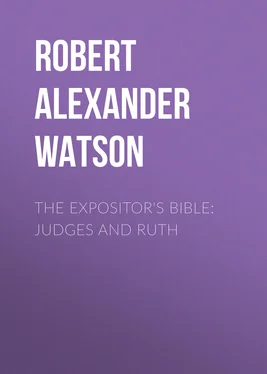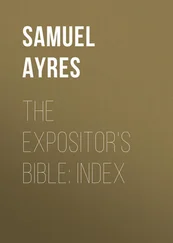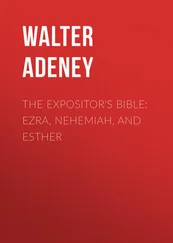Robert Alexander Watson - The Expositor's Bible - Judges and Ruth
Здесь есть возможность читать онлайн «Robert Alexander Watson - The Expositor's Bible - Judges and Ruth» — ознакомительный отрывок электронной книги совершенно бесплатно, а после прочтения отрывка купить полную версию. В некоторых случаях можно слушать аудио, скачать через торрент в формате fb2 и присутствует краткое содержание. Издательство: Иностранный паблик, Жанр: foreign_prose, foreign_religion, Философия, foreign_psychology, foreign_antique, на английском языке. Описание произведения, (предисловие) а так же отзывы посетителей доступны на портале библиотеки ЛибКат.
- Название:The Expositor's Bible: Judges and Ruth
- Автор:
- Издательство:Иностранный паблик
- Жанр:
- Год:неизвестен
- ISBN:нет данных
- Рейтинг книги:5 / 5. Голосов: 1
-
Избранное:Добавить в избранное
- Отзывы:
-
Ваша оценка:
- 100
- 1
- 2
- 3
- 4
- 5
The Expositor's Bible: Judges and Ruth: краткое содержание, описание и аннотация
Предлагаем к чтению аннотацию, описание, краткое содержание или предисловие (зависит от того, что написал сам автор книги «The Expositor's Bible: Judges and Ruth»). Если вы не нашли необходимую информацию о книге — напишите в комментариях, мы постараемся отыскать её.
The Expositor's Bible: Judges and Ruth — читать онлайн ознакомительный отрывок
Ниже представлен текст книги, разбитый по страницам. Система сохранения места последней прочитанной страницы, позволяет с удобством читать онлайн бесплатно книгу «The Expositor's Bible: Judges and Ruth», без необходимости каждый раз заново искать на чём Вы остановились. Поставьте закладку, и сможете в любой момент перейти на страницу, на которой закончили чтение.
Интервал:
Закладка:
Robert A. Watson
The Expositor's Bible: Judges and Ruth
THE BOOK OF JUDGES
I.
PROBLEMS OF SETTLEMENT AND WAR
It was a new hour in the history of Israel. To a lengthened period of serfdom there had succeeded a time of sojourn in tents, when the camp of the tribes, half-military, half-pastoral, clustering about the Tabernacle of Witness, moved with it from point to point through the desert. Now the march was over; the nomads had to become settlers, a change not easy for them as they expected it to be, full of significance for the world. The Book of Judges, therefore, is a second Genesis or Chronicle of Beginnings so far as the Hebrew commonwealth is concerned. We see the birth-throes of national life, the experiments, struggles, errors and disasters out of which the moral force of the people gradually rose, growing like a pine tree out of rocky soil.
If we begin our study of the book expecting to find clear evidence of an established Theocracy, a spiritual idea of the kingdom of God ever present to the mind, ever guiding the hope and effort of the tribes, we shall experience that bewilderment which has not seldom fallen upon students of Old Testament history. Divide the life of man into two parts, the sacred and the secular; regard the latter as of no real value compared to the other, as having no relation to that Divine purpose of which the Bible is the oracle; then the Book of Judges must appear out of place in the sacred canon, for unquestionably its main topics are secular from first to last. It preserves the traditions of an age when spiritual ideas and aims were frequently out of sight, when a nation was struggling for bare existence, or, at best, for a rude kind of unity and freedom. But human life, sacred and secular, is one. A single strain of moral urgency runs through the epochs of national development from barbarism to Christian civilization. A single strain of urgency unites the boisterous vigour of the youth and the sagacious spiritual courage of the man. It is on the strength first, and then on the discipline and purification of the will, that everything depends. There must be energy, or there can be no adequate faith, no earnest religion. We trace in the Book of Judges the springing up and growth of a collective energy which gives power to each separate life. To our amazement we may discover that the Mosaic Law and Ordinances are neglected for a time; but there can be no doubt of Divine Providence, the activity of the redeeming Spirit. Great ends are being served,—a development is proceeding which will by-and-by make religious thought strong, obedience and worship zealous. It is not for us to say that spiritual evolution ought to proceed in this way or that. In the study of natural and supernatural fact our business is to observe with all possible care the goings forth of God and to find as far as we may their meaning and issue. Faith is a profound conviction that the facts of the world justify themselves and the wisdom and righteousness of the Eternal; it is the key that makes history articulate, no mere tale full of sound and fury signifying nothing. And the key of faith which here we are to use in the interpretation of Hebrew life has yet to be applied to all peoples and times. That this may be done we firmly believe: there is needed only the mind broad enough in wisdom and sympathy to gather the annals of the world into one great Bible or Book of God.
Opening the story of the Judges, we find ourselves in a keen atmosphere of warlike ardour softened by scarcely an air of spiritual grace. At once we are plunged into military preparations; councils of war meet and the clash of weapons is heard. Battle follows battle. Iron chariots hurtle along the valleys, the hillsides bristle with armed men. The songs are of strife and conquest; the great heroes are those who smite the uncircumcised hip and thigh. It is the story of Jehovah's people; but where is Jehovah the merciful? Does He reign among them, or sanction their enterprise? Where amid this turmoil and bloodshed is the movement towards the far-off Messiah and the holy mountain where nothing shall hurt or destroy? Does Israel prepare for blessing all nations by crushing those that occupy the land he claims? Problems many meet us in Bible history; here surely is one of the gravest. And we cannot go with Judah in that first expedition; we must hold back in doubt till clearly we understand how these wars of conquest are necessary to the progress of the world. Then, even though the tribes are as yet unaware of their destiny and how it is to be fulfilled, we may go up with them against Adoni-bezek.
Canaan is to be colonised by the seed of Abraham, Canaan and no other land. It is not now, as it was in Abraham's time, a sparsely peopled country, with room enough for a new race. Canaanites, Hivites, Perizzites, Amorites cultivate the plain of Esdraelon and inhabit a hundred cities throughout the land. The Hittites are in considerable force, a strong people with a civilization of their own. To the north Phœnicia is astir with a mercantile and vigorous race. The Philistines have settlements southward along the coast. Had Israel sought a region comparatively unoccupied, such might, perhaps, have been found on the northern coast of Africa. But Syria is the destined home of the tribes.
The old promise to Abraham has been kept before the minds of his descendants. The land to which they have moved through the desert is that of which he took earnest by the purchase of a grave. But the promise of God looks forward to the circumstances that are to accompany its fulfilment; and it is justified because the occupation of Canaan is the means to a great development of righteousness. For, mark the position which the Hebrew nation is to take. It is to be the central state of the world, in verity the Mountain of God's House for the world. Then observe how the situation of Canaan fits it to be the seat of this new progressive power. Egypt, Babylon, Assyria, Greece, Rome, Carthage, lie in a rude circle around it. From its sea-board the way is open to the west. Across the valley of Jordan goes the caravan route to the East. The Nile, the Orontes, the Ægean Sea are not far off. Canaan does not confine its inhabitants, scarcely separates them from other peoples. It is in the midst of the old world.
Is not this one reason why Israel must inhabit Palestine? Suppose the tribes settled in the highlands of Armenia or along the Persian Gulf; suppose them to have migrated westward from Egypt instead of eastward, and to have found a place of habitation on towards Libya: would the history in that case have had the same movement and power? Would the theatre of prophecy and the scene of the Messiah's work have set the gospel of the ages in the same relief, or the growing City of God on the same mountain height? Not only is Canaan accessible to the emigrants from Egypt, but it is by position and configuration suited to develop the genius of the race. Gennesaret and Asphaltitis; the tortuous Jordan and Kishon, that "river of battles"; the cliffs of Engedi, Gerizim and Ebal, Carmel and Tabor, Moriah and Olivet,—these are needed as the scene of the great Divine revelation. No other rivers, no other lakes nor mountains on the surface of the earth will do.
This, however, is but part of the problem which meets us in regard to the settlement in Canaan. There are the inhabitants of the land to be considered—these Amorites, Hittites, Jebusites, Hivites. How do we justify Israel in displacing them, slaying them, absorbing them? Here is a question first of evolution, then of the character of God.
Do we justify Saxons in their raid on Britain? History does. They become dominant, they rule, they slay, they assimilate; and there grows up British nationality strong and trusty, the citadel of freedom and religious life. The case is similar, yet there is a difference, strongly in favour of Israel as an invading people. For the Israelites have been tried by stern discipline: they are held together by a moral law, a religion divinely revealed, a faith vigorous though but in germ. The Saxons worshipping Thor, Frea and Woden sweep religion before them in the first rush of conquest. They begin by destroying Roman civilization and Christian culture in the land they ravage. They appear "dogs," "wolves," "whelps from the kennel of barbarism" to the Britons they overcome. But the Israelites have learned to fear Jehovah, and they bear with them the ark of His covenant.
Читать дальшеИнтервал:
Закладка:
Похожие книги на «The Expositor's Bible: Judges and Ruth»
Представляем Вашему вниманию похожие книги на «The Expositor's Bible: Judges and Ruth» списком для выбора. Мы отобрали схожую по названию и смыслу литературу в надежде предоставить читателям больше вариантов отыскать новые, интересные, ещё непрочитанные произведения.
Обсуждение, отзывы о книге «The Expositor's Bible: Judges and Ruth» и просто собственные мнения читателей. Оставьте ваши комментарии, напишите, что Вы думаете о произведении, его смысле или главных героях. Укажите что конкретно понравилось, а что нет, и почему Вы так считаете.












